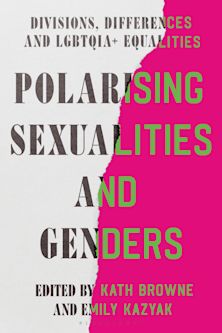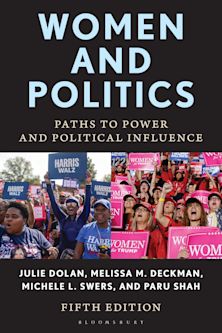- Home
- ACADEMIC
- Politics & International Relations
- Sexuality and Gender
- The Politics of Everybody
The Politics of Everybody
Feminism, Queer Theory, and Marxism at the Intersection
The Politics of Everybody
Feminism, Queer Theory, and Marxism at the Intersection
This product is usually dispatched within 1 week
- Delivery and returns info
-
Free US delivery on orders $35 or over
You must sign in to add this item to your wishlist. Please sign in or create an account
Description
The Politics of Everybody examines the production and maintenance of the terms 'man', 'woman', and 'other' within the current political moment; the contradictions of these categories and the prospects of a Marxist approach to praxis for queer bodies. Few thinkers have attempted to reconcile queer and Marxist analysis. Those who have propose the key contested site to be that of desire/sexual expression. This emphasis on desire, Lewis argues, is symptomatic of the neoliberal project and has led to a continued fascination with the politics of identity. By arguing that Marxist analysis is in fact most beneficial to gender politics within the arena of body production, categorization and exclusion Lewis develops a theory of gender and the sexed body that is wedded to the realities of a capitalist political economy.
Boldly calling for a new, materialist queer theory, Lewis defines a politics of liberation that is both intersectional, transnational, and grounded in lived experience.
Test
Table of Contents
The Politics of Everybody
Communitarian Ideals and Culture Wars
How is Every Body Sorted?
1. Terms of the Debate
Debates in Western Gender Politics
What is Capitalism?
Philosophy and the Marxian Roots of Queer Political Thought
Conclusion to Chapter One
2. Marxism and Gender
Don't be vulgar...
From the Woman Question to the Gender Question
Marxism at the Center and the Periphery
Marx on Women
Marx on Gender and Labor
The Major Works: Marx's 'Ethnological Notebooks' and Engels' 'Origin of the Family, Private Property, and the State'.
Early Marxist and Socialist Feminism
Theories of Social Reproduction
Race and Social Reproduction
Sexism, Marxism, and The Second Wave
3. Queer Politics and the Possibilities of a Queer/Trans Marxism
Beyond Idealist Models of Oppression
Ideology and Repetition: Race
Ideology and Repetition: Gender
Why Class is Not a Moral Category
The Rise of Queer Politics in the Mid to Late 20th Century
Marxist Critiques of Queer Theory
Beyond Homonormativity and Homonationalism
The Spinning Compass of American Queer Politics
Towards an Internationalist Queer Marxism
Conclusions
Solidarity is not Community
Ten Axioms Towards a Queer Marxist Future
Product details
| Published | Feb 15 2016 |
|---|---|
| Format | Hardback |
| Edition | 1st |
| Extent | 352 |
| ISBN | 9781783602889 |
| Imprint | Zed Books |
| Dimensions | 9 x 5 inches |
| Publisher | Bloomsbury Publishing |
About the contributors
Reviews
-
At a time when Marxist politics is struggling more than ever against the current, queer Marxist scholarship is enjoying a slight, startling, heartening resurgence. Holly Lewis' The Politics of Everybody is a major contribution to the trend.
Europe Solidare Sans Frontières
-
[A] thought provoking and original text.
Critical Social Policy
-
Like a breath of air from some enlightened future, this book will invigorate and inspire all readers looking for a fresh alternative to the smugly inward theoreticism of so much contemporary feminism and queer theory, advancing by leaps and bounds a conversation that has struggled to emerge for far too long.
James Penney, Trent University
-
Asks incisive questions about the relationship between the universal and the particular, between sex and gender, and sameness and difference. In so doing she rejects both an economistic reading of macro processes and an individuated reading of relations at the micro level. Ultimately it is a provocative book: for it provokes both thought and action.
Tithi Bhattacharya, Purdue University



































